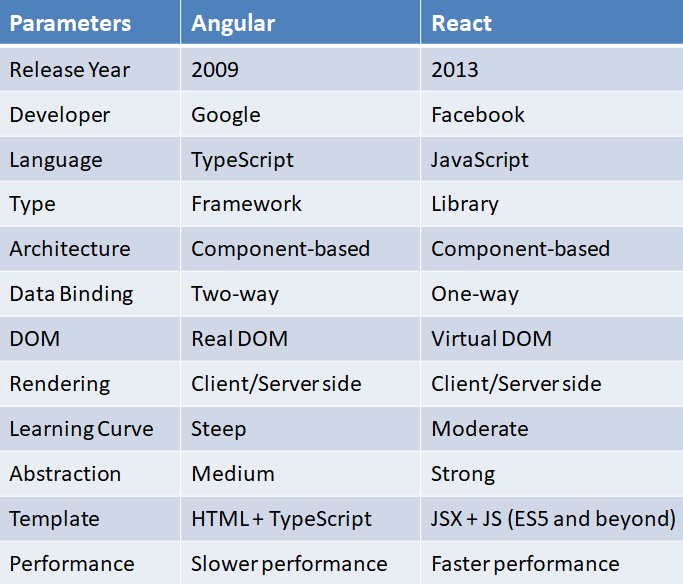Angular vs React: Which One is Best for Your Business?
- Web
- April 27, 2018
When it comes to selecting an appropriate JavaScript framework for the development of an exceptional web application, the developers have precisely got many options available.
There are many popular front-end JavaScript frameworks like Angular, React, Vue, etc. However, it becomes a tricky decision for the developers as each of these frameworks has its pros and cons.
Therefore, before finally choosing any one of them to proceed with your project, it would be highly recommended that you compare them and see which one fits your requirements the best.
Surely, it is going to be an exciting competition when all the two major JavaScript frameworks come under the same roof.
The experts do believe that this comparison must be made on different criteria that include the size and budget of the project, the features to be included in the web application, the expertise of the team members, interoperability, and so on.
Angular vs React: Brief Overview
Let’s have a look at what both Angular and React are.
What is Angular?
Well, AngularJS made its inception in the year 2009, i.e. a decade ago and one must give credit to tech giant Google for introducing it.
Angular is an open source client-side web framework to help Angular developers in resolving issues related to single page web development that was viewed multiple times.

It also helps in extending the HTML vocabulary by supporting the libraries. It receives the support of a large community base.
The Angular is still going high and after the release of Angular 12, the developers can look forward to choosing it.
Read also: Top most & Potent AngularJS Frameworks Recommended for Developers
The Benefits of Angular
- First, the developers will find it easier to develop a customized Document Model Object (DOM).
- You get the support of angular libraries, which helps in creating strong template solutions.
- It has the advantage of in-built injection subsystem dependency.
- If you have to conduct a unit test in Angular, you first have to inject the mock data into the controller and then view the result along with its behavior. You can develop each of the single pages separately and combine them with the components to see the outcome.
- It offers single routing and an eye-catching User Interface with data binding.
- It provides an extension to HTML syntax and you can build reusable components by directives.
- You have to essentially synchronize the data between the model view and component.
The three areas where Angular hogs the limelight are providing an amazing User Interface, being flexible due to the use of directives and filters, and making it more functional the last is testing, which is done by injecting the mock data into the controller.
What Are the Drawbacks of Angular?
Although Angular is popular amongst the web developers, it has some disadvantages that you should know:
- Though the developers can easily develop a customized Document Model Object (DOM), they may face problems related to the performance of DOM elements.
- Angular is a difficult pill to swallow so learning the ropes can be tricky.
- The developers find it hard to integrate the third party.
- It offers limited resources for routing.
- The debugging may prove difficult at times.
- It can be slow with the pages due to the embedding of pages interactive elements.
What is React?
The React has been developed by Social Media king Facebook in 2013. It is an open source dynamic JavaScript library that helps in creating amazing user interfaces.

In addition, it also helps to build single page applications and mobile apps as well. The aim behind introducing ReactJS was to provide better and faster speed, and make the development of applications easier and more scalable.
ReactJS is commonly used with other libraries like Redux. However, when it is working with the MVC (Model View Controller) architecture, it has to depend on V.
The Benefits of React
- You can reuse the codes in React.js and it also offers a simple debugging process.
- The components can be imported easily and its architecture is based on the components completely.
- Support of a React native library that offers high and efficient performance.
- It provides a superb user interface and you can easily get knowledge on API.
- The updates are much faster with both the front-end and server-side support.
- JavaScript extension syntax or JSX offers HTML quoting to render sub components.
- ReactJS allows developers to develop universal or isomorphic web applications with server-side rendering.
- It supports both iOS and Android platforms without any hassle.
- ReactJS is view oriented.
The major plus point of ReactJS is that it offers much more improved and better SEO services. You can operate it on the server to allow the virtual DOM to return as a common web page.
ReactJS allows you to build your own components, which can be reused or combined with the core content.
React.js also develops its own virtual DOM, which is the residing place of the components. It also monitors the updates related to DOM and DOM tree to offer optimal performance. It improves the efficiency of the DOM.
What Are the Drawbacks of React?
- The JavaScript extension syntax or JSX is not preferred by every web developer because of its complexity and stiff learning process.
- It is not a framework but rather a library.
- The new tools and documents keep on releasing, which makes it difficult for the developers to know what the codes are.
- The architectures keep changing.
- When you are incorporating ReactJS into MVC, you will probably need some configurations.
Angular vs React: The Complete Comparison

The prime differences between React and Angular depend on a few aspects. Let’s discuss them individually!
1. UI Component
The UI component is one differentiating factor in Angular vs. React. The React community creates its UI tools and there are many free and paid UI components in the React portal.
On the other hand, Angular features an in-built Material tech stack and comes with many pre-developed components of material design. This is why the UI configuration becomes very easy and quick.
2. Componentization
Angular features a highly complicated and fixed structure as it depends on 3 layers: Controller, View, and Model. Using Angular, developers can break down the app code into several files. This enables the repeated use of templates or elements in several parts of the app.
On the other hand, React does not select the same architecture. It provides an easy option to build element trees. The library features functional programming in which declarative component definitions are found.
React codes are structured logically and can be read easily. They don’t ask developers to write code.
3. Toolset: Angular or React?
React uses many code editing tools, such as Visual Studio, Atom, and Sublime Text. It utilizes the Create React App tool to bootstrap a project, whereas the Next.js framework is used for doing server-side rendering. To test an application written in React, developers can use many tools for various components.
Like React, Angular utilizes various code editors like Visual Studio, Aptana, and Sublime Text. Angular CLI helps build the project, whereas Angular Universal helps in the server-side rendering.
However, the main differentiating point between React and Angular is that you can fully test Angular using a single tool only. It can be Jasmine, Protractor, or Karma. And this one is a notable perk of Angular over React.
4. Documentation in React and Angular
In the Angular framework, the documentation is not faster because of the continuous development procedure. Also, many tutorials and documentation are still AngularJS, which are currently useless and outdated for the developers.
This case is not the same as ReactJS development. Although React is getting regular updates, the previous versions’ insights are still worthy.
5. Mobile App Solutions
When it comes to Angular vs React for mobile app development, Angular provides the Ionic framework that features an intriguing UI component library and a Cordova container. Hence, the built app seems like a web within a native web app container if it is viewed on a device.
The same is not seen in the ReactJS library. It provides a completely native UI experience that helps developers make their elements and bind them to native code written in Kotlin, Java, and Objective-C. Thereby, React is the winner here.
6. Productivity and Development Speed
Angular provides an improved experience of development, due to its CLI that enables building a workplace and designing functioning apps smoothly and creating elements and services using one-line commands, the in-built procedure for fixing detailed issues, and removing Typescript’s coding feature.
When it comes to React, productivity and the speed of development are impacted because of third-party libraries’ involvement. The ReactJS developers should decide on the right architecture alongside the tools.
Moreover, the toolkit for React apps varies from one project to another, meaning more effort and time is spent in case new developers handle the project for updating the app.
This signifies that Angular wins over React in terms of productivity and the speed of app development.
7. State Handling in Angular & React
An app utilizes states in several instances. An app’s UI is explained by an element at a certain point in time. Then the framework renders the total UI element again when the data transforms.
This way, an app makes sure to update the data. For state management on React, it opts for Redux as a solution, whereas Redux is not used in the case of Angular.
8. Popularity: React vs Angular
Compared to Angular, React has more searches according to Google Trends. According to stack overflow developer survey 2021, React.js is the most loved and wanted web framework by developers.

Although people take more interest in Angular because of the availability of its many readymade solutions, both technologies are growing. Hence, both front-end development frameworks are famous in the market.
9. Freedom and Flexibility
Flexibility is another aspect that is behind the difference between Angular and React. React framework offers the freedom of selecting the architecture, libraries, and tools for app development. It helps you create a tailored app with just the technology stack and features you need, given you have employed an expert ReactJS development team.
In comparison with React, Angular provides a limited amount of flexibility and freedom.
10. Testing in Angular & React
The testing and debugging of the Angular IO is possible for the entire project using one tool like Karma, Protractor, and Jasmine.
However, the same is not possible in terms of ReactJS app development. Some tools are needed to work out various sets of testing.
This maximizes the time and effort needed in the testing procedure. So, as per this aspect, Angular wins over React.
11. Data Binding in Angular & React
Data binding is another aspect that impacts the decision for selecting the right framework between Angular and React.

React utilizes one-way data binding in which the UI components can be changed just after altering the model state. Without updating the corresponding model state, developers can’t change the UI components.
On the other side, the two-way binding approach is pondered in the case of an Angular app. This method makes sure that the model state alters automatically when any alteration in the UI component is done, and vice-versa.
Although the approach of Angular appears effective and simpler, React’s approach provides an arranged and better data overview in terms of larger app projects. Thereby, React is the winner here.
12. Community Support in React & Angular
React gets more community support than Angular on GitLab and GitHub. According to the 2020 StackOverflow Developer Survey, the number of developers working on React.js projects is higher than developers working on Angular. Hence, React has much community support compared to Android.
13. App Functionality and User Experience
React utilizes Fiber and Virtual DOM for creating apps that make it cause Angular.
However, the newer versions of Angular have boasted elements and features like ShadowAPI that have established competition between these 2 frameworks deeper, without any failure in case of app functionality or size.
14. Document Object Model (DOM)
Angular employs real DOM where the entire tree data structure is up-to-date even in case its one segment is altered or changed.
On the other side, ReactJS uses Virtual DOM that allows app development agencies to track and update the alterations without impacting the other parts of the tree.
React is the winner in this context, as Virtual DOM is pondered quicker than real DOM.
15. Learning Curve: Angular vs React
Compared to React, Angular has an immersive learning curve. The Google Angular IO framework provides several options to fix a specific issue. It has a complicated component handling system and demands to be familiar with various concepts and languages, such as pipes, templates, RxJS, dependency injection, Typescript, etc.
Moreover, this framework is growing steadily and making it important for developers to check the latest trends in the Angular ecosystem and enhance their skills accordingly.
On the other hand, the same does not go for the ReactJS framework. React enables you to learn and build an app easily in the React ecosystem in case you are familiar with JavaScript.
ReactJS offers several helpful resources for beginners to learn the framework and plan for creating an app, even after regular updates are launched. For this reason, developers usually select React.
16. Directives
In React, the templates and logic are discussed at the end of every element. It allows the readers to learn what the code implies even without understanding its syntax.
In terms of Angular, the templates restored with attributes and Angular directives’ syntax are complex and sophisticated, making it not understandable for budding developers.
17. Component Architecture
Both React and Angular feature a component-based architecture. Thereby, they have modular, reusable, and cohesive elements. However, the difference between Angular and React is seen in terms of the technology stack.
On the other hand, React architecture employs JavaScript whereas Angular architecture goes with Typescript for web development which is error-free and more compact.
18. Ease of Update
Angular has an enhanced CLI that comprises commands like ng_update. This makes it possible to upgrade the app easily to the most recent Angular version. For this reason, Angular development becomes hassle-free, given maximum updating procedure is automated.
Likewise, React provides the capacity to make smooth moves between 2 versions. However, the front-end development library depends highly on the external libraries that make it possible to update and transition the third-party elements.
Moreover, developers must always check whether the used third-party libraries have compatibility with the current JS framework versions or not, which maximizes the developers’ efforts. Thereby, although both frameworks work towards making shifts from one version to another smoothly, React drags Angular.
19. Languages
React depends on the JavaScript ES6+ language that is integrated with the JSX script. On the other side, Angular utilizes JavaScript or Typescript. As Typescript is quite compact, navigating the code and tracing the typos become easier.
20. Self-Sufficiency
The apps written in React need to incorporate extra libraries. A few of those are Helmet, Redux, or React Router which is employed to optimize the procedure of state handling, routing, and communicating with the API.
Between Angular and React, the former is a full-fledged software development framework that has no requirement to incorporate any library. All functions are executed through the use of the Angular package.
Angular vs React: When to Choose What?
Let’s discuss the situations that are favorable for choosing Angular or React.
When to Choose Angular?
You should choose Angular framework as the right option for app development when:
- App complexity stays low to medium level.
- You need readymade solutions and better productivity.
- The development team is experienced in earlier versions of Angular, C#, and Java.
- You need a feature-rich large-scale app.
When to Choose React?
ReactJS is the best choice for app development when:
- You need to build shareable elements in your app project.
- You require an app with several events.
- A customized app solution is what you need.
- Your app development team is an expert in JavaScript, CSS, and HTML.
Which Is Better: Angular or React?
Both React and Angular are the most popular front-end technologies used by developers. They have lots of benefits, but, so far, React works better than Angular. It is utilized more, remains trendy, and grows continuously. Moreover, ReactJS receives huge development community support.
React wins over Angular because it executes virtual DOM and renders optimizations. Moreover, it’s easy to migrate between React versions. You don’t require installing updates one by one like Angular. Ultimately, React provides a lot of solutions for developers, which accelerate their development time and reduce several errors.
Whatever you think of the discussion regarding the comparison between Angular and React, you should make choices depending on your need for usability and functionality.
Angular vs React: Summing Up
So, what we can conclude from the above wide discussion is that all these two front-end JavaScript technologies are readily available and popularly used by web developers worldwide.
It only depends on what the project requirement is that you have to choose the right framework and maximize its benefits.
Angular is a comprehensive framework whereas React cannot be considered a framework but a library. React.js needs less coding and if you compare it with Angular based on performance, then obviously React proves to be better.
So, if you are searching for highly efficient JavaScript development services, contact us any time without any doubt.
FAQs About Angular vs React
Angular and React both are powerful and flexible. React needs less coding and if you compare it with Angular on the basis of performance, then obviously React proves to be better.
Undoubtedly, React is faster than Angular. The main aim of introducing React was to provide better and faster speed development.
Angular and React both have pros and cons. React is the perfect choice when you need a single-page application with multiple components and Angular is your way to go for the single component application.







